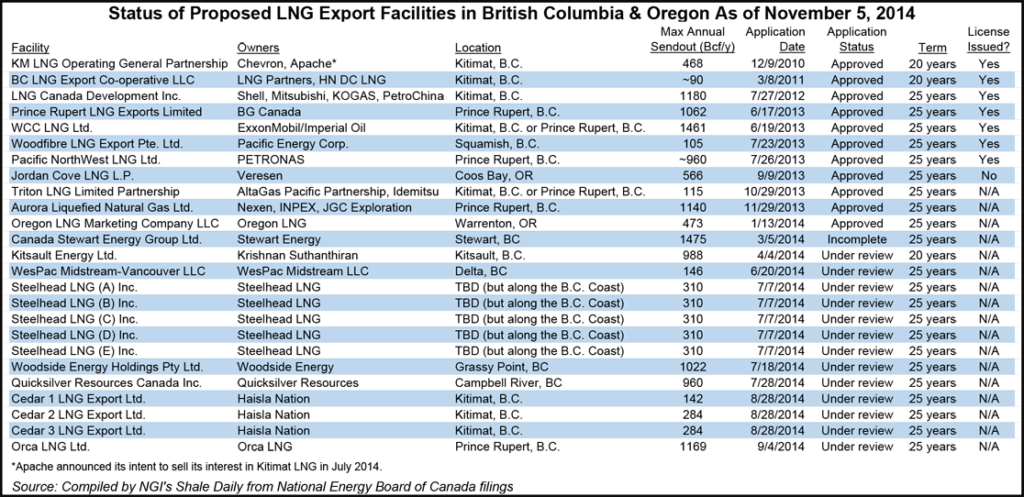LNG Canada FID in 2016, May Cost Up to C$40B, Says Shell
A final investment decision (FID) is expected in 2016 by Royal Dutch Shell plc and its partners for a massive liquefied natural gas (LNG) export project in British Columbia (BC), the sponsors said Friday.

LNG Canada, a consortium led by 50% owner Shell Canada Energy, is partnering with PetroChina Co. Ltd. (20%), Mitsubishi Corp. (15%) and South Korea’s Korea Gas Corp. (15%) for one of the largest of the 18 entries for the BC region (see Daily GPI, Feb. 14). According to an environmental assessment (EA) filed with the BC Environmental Assessment Office, the project could cost up to C$40 billion (US$35.3 billion) total, base four trains, with total capacity of 26 million metric tons/year.
With FID approval, the project would take up to five years to build, with the first two trains in operation in 2021.
“We are moving the project forward,” LNG Canada spokeswoman Susannah Pierce said in a conference call. “But there are a number of new steps that we need to get through, including the overall cost of this facility and how that meets our expectation…to a positive final investment decision.”
The EA comes just a few weeks after the BC government cut in half its LNG export tax and added corporate tax cuts as a lure to build tanker terminals (see Daily GPI, Oct. 22).
The EA “includes details regarding our proposed project’s economic and social benefits, environmental effects and mitigation measures to avoid or reduce those effects,” Pierce said. The consortium would be working “in a fairly high-cost environment” because of a shortage of labor and high construction costs. “We are going to need to make the economic case here in Canada, and it is challenging.”
The proposed facility, to be built in Kitimat, BC, would as an LNG facility be one of the lowest emitters of carbon dioxide in the world because it would use natural gas turbines to liquefy the gas and electricity from BC Hydro, the application stated.
Close to 4,500 people would be employed in the first phase of construction for two trains, peaking at 7,500 people. Four LNG trains are planned. Up to 450 people would be permanently employed to operate the facility, the EA noted.
The proposal has moved to the 180-day provincial review process. It also would require a separate OK from the Canadian Environmental Assessment Agency. LNG Canada already holds a long-term license from the National Energy Board to load tankers with 33 Tcf of gas over 25 years at a rate of up to 3.2 Bcf/d. The project is supported by the Haisla First Nation near Kitimat and by the Coastal First Nations. Engagement with other First Nations is continuing, the consortium noted.
© 2024 Natural Gas Intelligence. All rights reserved.
ISSN © 1532-1231 | ISSN © 2577-9877 |
